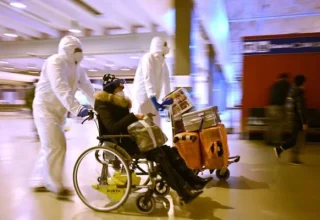
ISLAMABAD, Sep 16(ABC): People undergoing simulated night shift work who ate both during the day and at night saw an increase in symptoms of depression and anxiety, a new study found.
However, those who ate only during the day were apparently protected from the worsening of mood symptoms.
This suggests a possible way to improve the mental health of the millions of Americans who work evening, rotating, or on-call shifts, although more research is needed outside the sleep laboratory.
Night shift work causes a misalignment between the body’s circadian rhythm — or 24-hour internal “clock” — and a person’s sleep/wake cycle. This can increase the riskTrusted Source of obesity, metabolic syndrome, and type 2 diabetes.
Studies also show that night shift workers have a higher risk of poorer mental health, including greater symptoms of depression and anxiety.
“Our findings provide evidence for the timing of food intake as a novel strategy to potentially minimize mood vulnerability in individuals experiencing circadian misalignment, such as people engaged in shift work, experiencing jet lag, or suffering from circadian rhythm disorders,” study author Frank A. J. L. Scheer, PhD, director of the Medical Chronobiology Program at Brigham and Women’s Hospital in Boston, said in a news release.
The study was published September 12 in the Proceedings of the National Academy of Sciences.
Increase in depression and anxiety symptoms
The study included 19 participants — 12 men and seven women — who underwent simulated night work conditions in a laboratory.
This caused a circadian misalignment — a mismatch between their internal “clock” and behavioral/environmental cycles such as when they slept and the pattern of light and dark.
People in the study were randomly assigned to one of two meal timing groups. One group ate during both the day and night, which is common for night shift workers. The other group ate only during the day.
Researchers assessed participants’ depression- and anxiety-like mood levels every hour during their waking hours. These correspond to a group of mood states that typically occur in people with depressive disorder or anxiety-related disorder.
During the simulated night shift, people who ate during both day and night saw a 26% increase in depression-like mood levels and a 16% increase in anxiety-like mood levels, both in relation to their levels at the start.
The effect on mood was greater for people with a larger degree of circadian misalignment.
In contrast, people who ate meals only during the day saw no significant change in their depression- or anxiety-like mood levels.
The mood differences between the two groups is unlikely to be due to other factors, wrote the researchers in the paper, because the study conditions were the same for both groups, “except for the timing of meals.”
These identical conditions included calorie and macronutrient intake, physical activity, posture, sleep duration and lighting conditions.
“Shift workers — as well as individuals experiencing circadian disruption, including jet lag — may benefit from our meal timing intervention,” co-corresponding author Dr. Sarah L. Chellappa, now at the University of Cologne in Cologne, Germany, said in the release.
However, “the causal role of the timing of food intake on mental health remains to be tested,” she added. “Future studies are required to establish if changes in meal timing can help individuals experiencing depressive and anxiety/anxiety-related disorders.”
Timing meals for better mental health
Dr. Christopher Palmer, an assistant professor of psychiatry at Harvard Medical School, who was not part of the new research, said this was a “fascinating” study that fits with what is already known about the health risks of working at night.
“We have long known that shift workers have higher rates of mental disorders — in particular, depression and anxiety disorders — and also metabolic disorders such as obesity, diabetes, and cardiovascular disease,” he said.
While he said more research is needed, based on this study and similar research, “I do think it is advisable for shift workers to at least try eating their meals during daytime hours for a few weeks to see if it makes a difference for them, in terms of mood and anxiety symptoms.”
This study is most relevant to shift workers and others with disrupted sleep schedules. But some research shows that late-night eating may also impact the health of people who don’t work at night.
Studies have found a link between eating late at night and a higher risk of coronary heart diseaseTrusted Source, difficulty losing weightTrusted Source, and overeatingTrusted Source.
In addition, people who get up frequently in the middle of the night to snack — what’s known as night eating syndrome — may be at higher risk of depressionTrusted Source and psychological distressTrusted Source.
Palmer, author of the forthcoming book, “Brain Energy: A Revolutionary Breakthrough in Understanding Mental Health—and Improving Treatment for Anxiety, Depression, OCD, PTSD, and More,” said this kind of research is complex because many factors are involved — changes in sleep, circadian rhythms, eating behaviors, stress responses and mood symptoms.


























